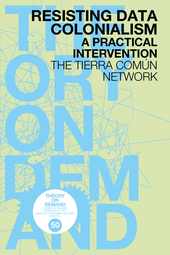
Resisting Data Colonialism: A Practical Intervention
Some people think that colonialism is long over, while others are sure it has never stopped. This event marks the launch of a book exploring a third possibility: not only is colonialism still continuing, but right now it is morphing into possibly its most powerful version yet. This is data colonialism.
In 2020 Tierra Común network was formed: a network of activists, citizens and scholars, mainly from Latin America, aimed at resisting data colonialism. This event celebrates the launch of the book Resisting Data Colonialism – A Practical Intervention, collaboratively written by members of Tierra Común. The book is intended as a toolkit for understanding what data colonialism is, who it harms, and how it can be resisted. It brings together a wealth of different perspectives, from the racialized aspects of digital capitalism to the relations between gender/sexuality and digital technologies. It also includes “Stories of Resistance”, case studies written by different communities around the world which reflect on how they are resisting data colonialism in their lived realities.
This event includes a talk by two of the chapters’ authors, as well as complementary perspectives from scholars who work on similar issues. We will discuss, for example, the potentials and limitations of the frame of data colonialism today, as well as how we can bring these concepts to bear for a decolonial praxis.
About the speakers
Paola Ricaurte is an associate professor at the Department of Media and Digital Culture at Tecnológico de Monterrey and a faculty associate at the Berkman Klein Center for Internet & Society at Harvard University. Together with Nick Couldry and Ulises Mejías, she co-founded Tierra Común, a network of academics, practitioners and activists interested in decoloniality and data.
Bidisha Chaudhuri is an Assistant Professor of Government, Information Cultures and Digital Citizenship at the Department of Media Studies (Archival and Information Studies) at the University of Amsterdam. She received her PhD from the South Asia Institute at Heidelberg University, Germany. Her current research interests include digital governance and infrastructures, politics of data and algorithms, political economy of digital technologies and work practices and AI ethics.
Randon R. Taylor is currently a Post-doctoral researcher at the Institute for Logic, Language and Computation at the University of Amsterdam. He received his PhD in sociology from the University of Miami in Miami, Florida. His research focus spans social determinants of health, technology and society, and health disparities. He is currently exploring the advantages of democratizing AI for both organizations and society. Additionally, he is investigating methods of digital resistance within African diaspora communities.
Gabriel Pereira (moderator) is Assistant Professor in AI & Digital Culture at the University of Amsterdam (UvA), based at the Department of Media Studies and the Institute for Logic, Language and Computation (ILLC).

:rgb(-15)

:rgb(-25)

:rgb(8)
